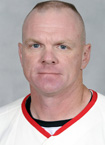Sept. 28, 2012
Nine
Innings with
John Szefc
By Sean Ryan
CollegeBaseballInsider.com Co-Founder
 A
year ago, Maryland narrowly missed out on an at-large bid to the
NCAA Tournament. A
year ago, Maryland narrowly missed out on an at-large bid to the
NCAA Tournament.
Shortly after the season, coach Erik Bakich
traded his rebuilding tools in to take the head job at Michigan.
The Terps turned to John Szefc (pronounced chef) to pick
up where Bakich left off.
In Szefc, Maryland gets a leader who won 61
percent of his games in seven years as head coach at Marist
(212-137-1) and guided the Red Foxes to four NCAA appearances.
It also gets a coach who spent 10 years honing his skills as an
assistant in the Sun Belt and Big 12.
Szefc, who starred as an
outfielder at Drexel and earned a master’s degree in sports
administration at Temple, took time out to answer questions from
CollegeBaseballInsider.com.
First Inning – How does it feel to be running
your own program again?
Tremendous; I really enjoyed it at Marist, and we were lucky
enough to have great players and assistant coaches that led to
success. I guess I have always had running my own program in my
blood.
Second Inning – When you left your head coaching position at
Marist to become an assistant at Louisiana-Lafayette, what were
some of the reasons?
Felt we had reached a peak at Marist with four NCAA Tournament
appearances, finishing third in the last three. I was ready for
a new challenge.
Third Inning – How did stepping back into an assistant’s role
help you as a coach?
It helped very much, both recruiting and coaching-wise.
Seeing how all three guys I worked for did it gave me great
perspective and additional coaching knowledge. I can’t put a
price on what I learned from those three men.
Fourth Inning – What’s the most important thing you learned
from the head coaches at your three previous stops, Tony
Robichaux (ULL), Ritch Price (Kansas) and Brad Hill (Kansas
State)?
Tony is great on creating ball park atmosphere – creating
the show at the park. He taught me about building the program in
the public’s eye among many other things. Ritch may be the
nicest person in college baseball. He is huge on the positive.
Baseball can be a very negative game, but Ritch always sees the
positive and conveys it to the players. He also taught me about
creating a relaxed positive atmosphere for players and coaches
to work in everyday – to get the most out of them. Brad gave me
a lot in just 18 months; great ideas about preparing an offense,
outstanding practice organization and the best ways to use
weight training. Finally, he taught me about coaching the speed
part of the game. He is a very smart baseball man – as all three
of them are.
Fifth Inning – As a hitting coach, are you more Ted Williams
or Charlie Lau? And where else did you build your coaching
philosophies?
I’d say a Ted Williams-type coach. I have built my philosophies
over 22 years of doing it. Working with different coaches and
players and taking things from different guys, trying to create
my own niche.
Sixth Inning – Why Maryland, and why now?
Maryland provides an outstanding situation for growth moving
forward. The previous staff did a good job setting this program
up in many ways. I have been able to put the exact staff
together that I had hoped for. It has created a great situation
to put a solid roster in position to be successful. It was also
a great situation for my wife and children.
Seventh Inning – The Terps nearly made the NCAA field a year
ago. How do you and Maryland take the next step?
Preparation each day and executing a well-rounded defensive and
offensive plan to take a strong, experienced group of returners
and blend them with a great incoming recruiting class.
Eighth Inning – Maryland has eliminated sports because of
budget constraints. How, if at all, has baseball been affected?
I think the administration here gives our program great
support and resources to work with.
Ninth Inning – Becoming a head coach in the ACC is
___________:
Very rewarding to me. It is a great challenge
that I enjoy working at each day.
(photo courtesy of Maryland Media Relations Office)
|